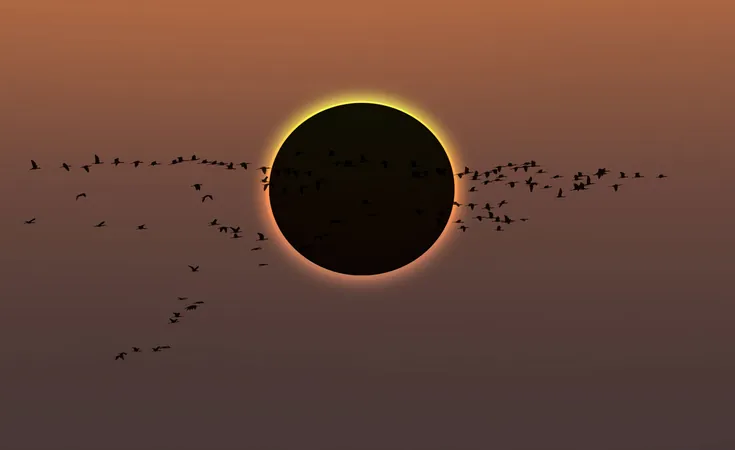
Eclipse Surprises: How the 2024 Solar Event Changed Bird Behavior
2025-04-10
Author: Jia
A Celestial Phenomenon Unveiled
On April 8, 2024, millions across North America turned their eyes skyward to witness a rare total solar eclipse. But while humans marveled at the sun's disappearance, a team of scientists was busy tracking a remarkable phenomenon: the behavior of birds during this extraordinary cosmic event.
A Symphony of Silence
The research team, consisting of experts from Loggerhead Instruments and the K. Lisa Yang Center for Conservation Bioacoustics at Cornell Lab of Ornithology, made a fascinating discovery: birds fell unusually silent during the eclipse. However, this silence was predominantly observed in areas where the sun was nearly completely covered.
Groundbreaking Research Methodology
In a pioneering effort, the scientists monitored data from 344 Haikubox devices—community-powered acoustic monitors scattered throughout North America. This extensive study was the first to employ the Haikubox network for analyzing bird vocalizations.
Using advanced neural network technology, the researchers effectively filtered out human interference to capture authentic bird behavior.
The Quiet Mystery of Totality
Dr. David Mann, the lead author of the study, stated, "Anecdotal evidence suggested that birds might go silent during a total eclipse, but our research quantifies this phenomenon. We found that on average, birds do indeed quiet down during totality, but the degree of darkness is crucial." In places where over 99% of daylight was blocked, vocal activity plummeted.
Diverse Responses to Darkness
Birds didn’t all respond uniformly; intriguing differences emerged among species and locations. For instance, black-capped chickadees in New York remained quiet long after totality, while their counterparts in Vermont became more vocal during the eclipse's darkest moments. In stark contrast, some American robins in Kentucky continued to sing, whereas pine siskins in Maine went completely silent.
Dr. Mann noted, "The variability in bird behavior left us with more questions. Despite analyzing conditions like temperature and wind, we found no significant links to vocalization changes. This suggests the eclipse's sudden darkness was a primary factor."
Eliminating Human Disturbance
One crucial aspect of the study was isolating human noise from the data. By adjusting for areas where human activity might influence bird behavior, scientists ensured their findings were a genuine response to the eclipse.
Dr. Mann commented, "Initial data showed a marked decline in bird vocalizations during peak totality, but deeper analysis revealed that human excitement likely disrupted expected responses."
Harnessing Community Science with Technology
The Haikubox initiative empowers individuals to contribute to wildlife monitoring through sound. Each device records bird calls and uploads the data to a central database, promoting a non-intrusive method for collecting wildlife behavior insights.
Dr. Mann remarked, "In an era where technology tends to disconnect us from nature, Haikubox fosters engagement, combining AI and environmental stewardship to enhance our understanding of the natural world."
Implications Beyond the Eclipse
The implications of this study extend beyond eclipses, shedding light on how birds react to sudden changes in light. Dr. Mann added, "Our findings may influence future investigations into the effects of light pollution on avian behavior. When community science and smart technologies unite, extraordinary discoveries about wildlife become possible."
Join the Movement
The research team encourages more people to participate in community science initiatives. Enhancing the listening network enables broader data collection on animal behaviors.
Dr. Mann emphasized, "Passive acoustic monitoring is vital for understanding animal behavior, and average citizens play a key role in expanding our research capabilities. By placing a Haikubox in your yard, you contribute to over 1 billion recordings that are paving the way for scientific advancement."
Unlocking Nature's Secrets
The full findings of this groundbreaking study were published in the journal Scientific Reports, igniting curiosity about the relationship between celestial events and wildlife behavior.



 Brasil (PT)
Brasil (PT)
 Canada (EN)
Canada (EN)
 Chile (ES)
Chile (ES)
 Česko (CS)
Česko (CS)
 대한민국 (KO)
대한민국 (KO)
 España (ES)
España (ES)
 France (FR)
France (FR)
 Hong Kong (EN)
Hong Kong (EN)
 Italia (IT)
Italia (IT)
 日本 (JA)
日本 (JA)
 Magyarország (HU)
Magyarország (HU)
 Norge (NO)
Norge (NO)
 Polska (PL)
Polska (PL)
 Schweiz (DE)
Schweiz (DE)
 Singapore (EN)
Singapore (EN)
 Sverige (SV)
Sverige (SV)
 Suomi (FI)
Suomi (FI)
 Türkiye (TR)
Türkiye (TR)
 الإمارات العربية المتحدة (AR)
الإمارات العربية المتحدة (AR)